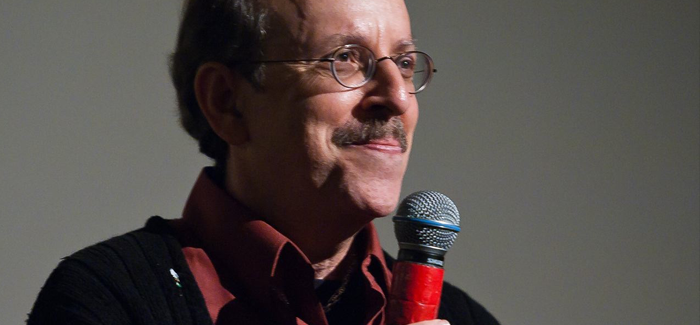
Newborn lectures at Long Island’s Cinema Arts Centre. (Photography by Harvey Birnbaum)
Jud Newborn, AM’77, PhD’94, brings Nazi resisters out of the past into the present.
He remembers the day vividly. Jud Newborn, AM’77, PhD’94, was about five years old and visiting his grandmother in Brooklyn. A Jewish immigrant from Kremenets, Ukraine, she was, recalls Newborn, "the essence of joviality. I thought the crinkle lines in her eyes came from too much laughing.” But on that day, Newborn went digging in her bureau drawer and uncovered a sepia photograph on thick cardboard stock, a family portrait of several generations. He rushed to show his grandmother the picture. “Her face turned red. Her eyes became wet as she turned away, and she said, in her Yiddish accent, ‘Don’t ask me. Hitler burnt them all.’”
“It was incomprehensible,” says Newborn, “the very thought that people might be burned by anyone, and I had no idea who Hitler was.“ The incident affected him profoundly: “It was not so much anger and rage. It was a need to understand.”
Newborn has since built a three-decades-long career as a Holocaust expert and human rights activist. His 1986 book, Shattering the German Night, reprinted in 2006 as Sophie Scholl and the White Rose, chronicles a nonviolent Nazi resistance movement led by German university students and a philosophy professor. With 2013 marking 70 years since the capture and execution of six White Rose members, their story and Newborn’s work have been featured in publications such as the New York Times, Haaretz, and the Sept–Oct/13 University of Chicago Magazine.
Newborn has also been traversing the country to deliver his White Rose multimedia presentation, which features music, photos, and his trademark theatrical delivery. Up next is the October 10 John Zahm Lecture in American Catholic Education at the University of Portland, an event open to the public. There Newborn will pay particular attention to White Rose member and devout Catholic Willi Graf, who was executed in October 1943. Newborn drew a contrast between Graf and the former Pope Benedict in a March Washington Spectator article.
The point of his presentation, explains Newborn, is to tie the Holocaust and those who resisted it to modern-day events and heroes, whom he calls “White Rosers.” “This is the only way you can make the Holocaust relevant in the 21st century,” he says. “Most Holocaust educational organizations realize now that you need to tell the Holocaust in its own terms, but it is also a touchstone that can be used to talk about different forms of injustice and what we can do about them in the 21st century. Otherwise it’s going to become dusty like the Civil War.”
Updated 02.20.2018
